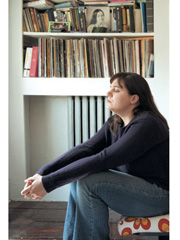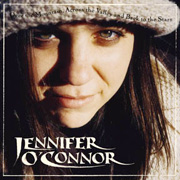Over, Across, and Back
Jennifer O’Connor, the lesbian singer/songwriter, makes her major label debut. UNABRIDGED WEB VERSION

After making a significant impression with her independently released 2004 album, The Color and the Light, out singer/songwriter Jennifer O’Connor has returned with her major label debut, Over the Mountain, Across the Valley and Back to the Stars (Matador). O’Connor visits familiar territory on her musical journey, such as love and family, but her uncommon approach to transforming it into something musical—”the bumpy ride through space and time” of “Complicated Rhyme,” for instance—is what makes the trip such a memorable one. I spoke to O’Connor last September.
_____________________
Gregg Shapiro: Because your new album is being released on Matador, I have to begin by asking you what you think about the Liz Phair comparisons that pop up in articles written about you?
Jennifer O’Connor: I used to be a little bit by bothered by them. But I don’t really care about them so much anymore. I’ve kind of gone through this process where first I was excited and then I got annoyed because it was the first thing anyone would say. Now I’ve kind of gone through the grieving process. [Laughs] I feel like people just say it now because it’s been said before.
Personally, I actually hear a little more Sarah Dougher than Liz Phair.
Everybody hears something. [Laughs] But that’s cool. I like to listen to the people I get compared to, so I try to look at it as a compliment.
When you are writing songs, does the music come first or do the words, or does it vary from song to song?
 Usually it all happens together, for the most part. There are exceptions, and sometimes it happens both of the ways you said. Usually, I just sit down with a guitar and just play, mess around, and then start writing words.
Usually it all happens together, for the most part. There are exceptions, and sometimes it happens both of the ways you said. Usually, I just sit down with a guitar and just play, mess around, and then start writing words.
The album’s title, Over the Mountain, Across the Valley and Back to the Sea, is drawn from opening track “Century Estates.” When a line from a song becomes the album title, does that give the song more significance?
That was the last song that I wrote when I was writing the record. I was trying to come up with the title [laughs] and I felt like that line fit, encapsulated the vibe of the record. I think that’s why I also put that song first, because it seemed like a good opening for some reason, in some ways because it was written last, I think.
Your sisters figure prominently in your work. Can you say something about what it means to you as a songwriter to be able to immortalize people, especially those you love, in song?
It’s funny, it’s become more clear to me that I guess that’s what I’ve been doing, because people ask me that a lot. [Laughs] It just felt natural to me while I was doing it. It was what was going on in my life. It feels good to have made something from painful situations.
In addition to people, places can also be commemorated in song, as you have done in “Exeter, Rhode Island,” and before that in “Pink Florida.”
When I write, a lot of it comes from the details in my life. The more specific you can be with an idea or a thought, the more memorable it is, in a song or in literature or anything. I wouldn’t say that I plan out writing about certain people or places specifically, it just happens. [Laughs] It’s nice because it really grounds the songs.
Yeah, thanks. I think that’s probably true.
Over The Mountain… is dominated by refreshing love songs, proof that it is still a subject of limitless possibilities. Do you like writing love songs best, or are there kinds of songs that you prefer?
I don’t really have a favorite type of song [laughs], to be honest. I think that it’s maybe harder to write a song like that than another type of song because it’s been done so much. I try not to think about other people’s songs or what’s been done before when I write because I’d drive myself crazy. Everything’s been done! [Laughs] I don’t really plan out the songwriting. It sort of happens based on what’s floating around up in my brain or happening in my life or what comes down on me when I pick up the guitar.
You’ve cited Sleater-Kinney in the past and even have a link to them on your website. How do you feel about the band going on hiatus?
It’s weird, the day I found out, I was really upset. They’ve been such an inspiration to me. But then, I figured that they’ve got other stuff that they want to do. That’s cool. At least they’re not dead. [Laughs] That’s happened before with musicians I’ve really loved. I try to look at it that way and just be happy for them. I’m sure they’ve got other avenues they want to pursue. I got the feeling that we’ll hear more from them musically, individually anyway.
As an out musician, would you say that you have felt support from the community of GLBT musicians?
Not really, no. I certainly know a few other gay musicians. But it’s not like it’s a big group where we support each other, per se. Not because I do or don’t want to. It hasn’t really worked out that way for me. It’s always been something that I am, but it’s not really connected to my music, I don’t feel.
What about in terms of your fan base? Are you aware of a following in the community?
A little. I think it’s happened more recently as it’s become more [laughs] known that I’m gay. I’ll notice a few people in the audience that are obviously gay [laughs], but not a lot. I wouldn’t say that it’s a predominantly gay audience, no.
Your music publishing company, Truth Love Work, sounds like something of a personal credo. Am I on the right track?
[Laughs] Kind of. It was the name of the first EP that I did. Actually, my girlfriend at the time drew the cover for it. It was just part of the cover that she drew. She wrote that on there, and I liked it and used it and it kind of has become that [a credo]. It’s from some sort of yoga Buddhist book that she was reading at the time. [Laughs] It’s worked out nicely. I really like it.
Speaking of CD graphics, Crump’s artwork is featured in the CD booklet and on your website. Can you say something about that?
She’s this amazing woman, Brittney Crump, that I met randomly on-line. She lives in TO COME, and I’ve never actually met her [in person]. I came across one of her drawings on-line and fell in love with it. I made it my screensaver for a long time—it’s the one with the cactus and the balloon. When we started working on the art, we were going to use a photo for the cover, and I was thinking that it would be really neat to use that drawing, and then I took it a step further and thought maybe she’d like to draw an illustration for each song. I got in contact with her, and I sent her the record, and she did it. I really connected with her drawings and she really connected with the record, too. I can’t wait to meet her.
Your second album, The Color and the Light, was released in 2005, and the new album was just released, with a little over a year separating the two. Do you think you are someone who is up to the task of releasing an album every year?
Yeah, I hope so. Maybe a year, year and a half. I’d like to keep going along with it. I was just thinking about that in the last couple of days. The record just came out last week, and I’m already like, “I need to get back in the studio.” [Laughs] You have to keep planning and looking forward.
Gregg Shapiro is a past recipient of the annual OutMusic award that recognizes contributions by non-musicians in furthering the work of GLBT performers.











Comments